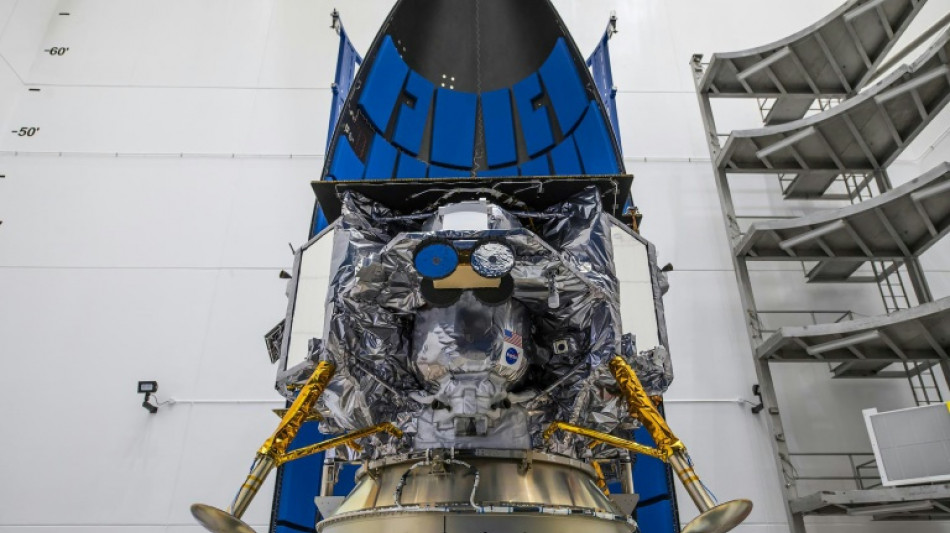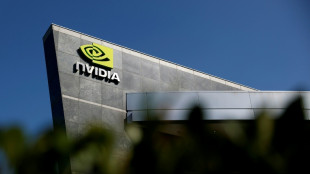
-
 Loaf behind bars: Aussie inmate says Vegemite a human right
Loaf behind bars: Aussie inmate says Vegemite a human right
-
In film's second act, 'Wicked' goes beyond Broadway musical

-
 Asian markets track Wall St down with Nvidia, US jobs in view
Asian markets track Wall St down with Nvidia, US jobs in view
-
Scott Boland: the best 'spare' fast bowler around

-
 Fire and Ashes: England bank on fast bowling barrage in Australia
Fire and Ashes: England bank on fast bowling barrage in Australia
-
North Korea says Seoul-US sub deal will trigger 'nuclear domino' effect

-
 Education for girls hit hard by India's drying wells
Education for girls hit hard by India's drying wells
-
Haitian gangs getting rich off murky market for baby eels

-
 Trump says will talk to Venezuela's Maduro, 'OK' with US strikes on Mexico
Trump says will talk to Venezuela's Maduro, 'OK' with US strikes on Mexico
-
Oscar Piastri wins Australia's top sports honour

-
 'Severely restricted': Russia's Saint Petersburg faces cultural crackdown
'Severely restricted': Russia's Saint Petersburg faces cultural crackdown
-
Polish PM denounces 'sabotage' of railway supply line to Ukraine

-
 UK toughens asylum system with radical overhaul
UK toughens asylum system with radical overhaul
-
Carney's Liberals pass budget, avoiding snap Canada election

-
 LeBron back in training, edges closer to Lakers return
LeBron back in training, edges closer to Lakers return
-
Climate talks run into night as COP30 hosts seek breakthrough

-
 Germany and Netherlands lock up World Cup spots in style
Germany and Netherlands lock up World Cup spots in style
-
Germany's Woltemade hopes for 2026 World Cup spot after scoring again

-
 Germany 'send message' with Slovakia rout to reach 2026 World Cup
Germany 'send message' with Slovakia rout to reach 2026 World Cup
-
Trump unveils fast-track visas for World Cup ticket holders

-
 Netherlands qualify for World Cup, Poland in play-offs
Netherlands qualify for World Cup, Poland in play-offs
-
Germany crush Slovakia to qualify for 2026 World Cup

-
 Stocks gloomy on earnings and tech jitters, US rate worries
Stocks gloomy on earnings and tech jitters, US rate worries
-
'In it to win it': Australia doubles down on climate hosting bid

-
 Former NFL star Brown could face 30 yrs jail for shooting case: prosecutor
Former NFL star Brown could face 30 yrs jail for shooting case: prosecutor
-
Fate of Canada government hinges on tight budget vote

-
 New research measures how much plastic is lethal for marine life
New research measures how much plastic is lethal for marine life
-
Mbappe, PSG face off in multi-million lawsuit

-
 EU defends carbon tax as ministers take over COP30 negotiations
EU defends carbon tax as ministers take over COP30 negotiations
-
McCartney to release silent AI protest song

-
 Stocks tepid on uncertainty over earnings, tech rally, US rates
Stocks tepid on uncertainty over earnings, tech rally, US rates
-
Louvre shuts gallery over ceiling safety fears

-
 'Stranded, stressed' giraffes in Kenya relocated as habitats encroached
'Stranded, stressed' giraffes in Kenya relocated as habitats encroached
-
US Supreme Court to hear migrant asylum claim case

-
 Western aid cuts could cause 22.6 million deaths, researchers say
Western aid cuts could cause 22.6 million deaths, researchers say
-
Clarke hails Scotland 'legends' ahead of crunch World Cup qualifier

-
 S.Africa says 'suspicious' flights from Israel show 'agenda to cleanse Palestinians'
S.Africa says 'suspicious' flights from Israel show 'agenda to cleanse Palestinians'
-
South Korea pledges to phase out coal plants at COP30

-
 Ex-PSG footballer Hamraoui claims 3.5m euros damages against club
Ex-PSG footballer Hamraoui claims 3.5m euros damages against club
-
Mbappe, PSG in counterclaims worth hundreds of millions

-
 Two newly discovered Bach organ works unveiled in Germany
Two newly discovered Bach organ works unveiled in Germany
-
Stocks lower on uncertainty over earnings, tech rally, US rates

-
 Barca to make long-awaited Camp Nou return on November 22
Barca to make long-awaited Camp Nou return on November 22
-
COP30 talks enter homestretch with UN warning against 'stonewalling'

-
 France makes 'historic' accord to sell Ukraine 100 warplanes
France makes 'historic' accord to sell Ukraine 100 warplanes
-
Delhi car bombing accused appears in Indian court, another suspect held

-
 Emirates orders 65 more Boeing 777X planes despite delays
Emirates orders 65 more Boeing 777X planes despite delays
-
Ex-champion Joshua to fight YouTube star Jake Paul

-
 Bangladesh court sentences ex-PM to be hanged for crimes against humanity
Bangladesh court sentences ex-PM to be hanged for crimes against humanity
-
Trade tensions force EU to cut 2026 eurozone growth forecast


Private US lunar lander mission imperiled by technical snag
An historic private mission to land on the Moon was facing potential failure Monday due to technical problems, in a blow to America's hopes of placing its first robot on the lunar surface in five decades.
Fixed to the top of United Launch Alliance's new Vulcan rocket, Astrobotic's Peregrine Lunar Lander blasted off overnight from Florida's Cape Canaveral Space Force Station, then successfully separated from its launch vehicle around an hour later.
But teams at ground control found they were unable to point the unmanned spacecraft correctly at the sun, necessary for its top-mounted solar panel to achieve maximum power generation for Peregrine's systems.
In its latest update, Astrobotic tweeted: "The team believes that the likely cause of the unstable sun-pointing is a propulsion anomaly that, if proven true, threatens the ability of the spacecraft to soft land on the Moon."
The company added Peregrine is currently in an expected communication blackout, and it would provide further updates once contact is re-established.
Peregrine is supposed to reach the Moon, then maintain an orbit for several weeks before touching down on a mid-latitude region of the Moon called Sinus Viscositatis, or Bay of Stickiness, on February 23.
Until now, a soft landing on Earth's nearest celestial neighbor has only been accomplished by a handful of national space agencies: the Soviet Union was first, in 1966, followed by the United States, which is still the only country to put people on the Moon.
China has successfully landed three times over the past decade, while India was the most recent to achieve the feat on its second attempt, last year.
Now, the United States is turning to the commercial sector to stimulate a broader lunar economy and ship its own hardware at a fraction of the cost, under the Commercial Lunar Payload Services (CLPS) program -- but a failure for Astrobotic could lead to criticism of the new strategy.
- Failure commonplace -
NASA paid Astrobotic more than $100 million for the task, while another contracted company, Houston-based Intuitive Machines, is looking to launch in February and land near the Moon's south pole.
NASA says they will help pave the way for its Artemis program to return astronauts to the Moon later this decade, in preparation for future missions to Mars.
Controlled touchdown on the Moon is a challenging undertaking, with roughly half of all attempts failing.
In the absence of an atmosphere that would allow the use of parachutes, a spacecraft must navigate treacherous terrain using only its thrusters to slow descent.
Private missions by Israel and Japan, as well as a recent attempt by the Russian space agency, have all ended in failure -- though the Japanese Space Agency is targeting mid-January for the touchdown of its SLIM lander launched last September.
This weekend's blast-off was the first launch for ULA's Vulcan rocket, maintaining the company's 100 percent success rate in more than 150 launches.
Vulcan is planned to have reusable first stage booster engines, which the company, a joint venture between Lockheed Martin and Boeing, expects will save costs.
- Navajo objections -
On board Peregrine is a suite of scientific instruments that will probe radiation and surface composition, helping to pave the way for the return of astronauts.
But it also contains more colorful cargo, including a shoebox-sized rover built by Carnegie Mellon University, a physical Bitcoin and cremated remains and DNA, including those of Star Trek creator Gene Roddenberry, legendary sci-fi author and scientist Arthur C. Clarke and a dog.
The Navajo Nation, America's largest Indigenous tribe, has objected to sending human remains, calling it a desecration of a sacred space. Though they were granted a last-ditch meeting with White House and NASA officials, their objections failed to remove the cargo.
D.AbuRida--SF-PST




